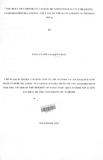| dc.description.abstract | As in any relationship, communication is key to a strong business relationship. This can be the relationship between business and customer, or, equally as important, the internal relationships among different employees within the company. The importance of keeping the lines of communication with one's business partner cannot be overemphasized. A relationship can only survive if the parties involved maintain an open line of communication.
This concept becomes even more relevant when the partnership entails an international agreement where the enhanced distance between the partners will exacerbate the need to keep in touch. The line of communications needs to be a two way process and should flow back and forth. Many joint ventures have collapsed or have gradually fallen apart needlessly due to a lack of communication between the parties involved. International agreements are especially prone to dissolution when the partners fail to maintain a respectable level of contact.
This study sought to find out whether KPA's communication policy is effective in coordinating communication with stakeholders (internal and external) and whether relationships are being built which are beneficial to the authority and how they affect business facilitation and trade. The study also sought to find out whether there is a deliberate effort to continuously communicate with stakeholders, whether the current communication satisfies the desires of all players and the type of channels used and whether they are effective in communicating with stakeholders .
To achieve these objectives, this study used interviews to source information from seruor officials in selected firms especially in the logistics, marketing, import, export and shipping departments who interact with the Port. The study reveals that communication in KPA is not done in a transparent manner and KP A seems not to be making any efforts to communicate with its stakeholders in between meetings. There is a general disatisfaction in the channels used by KPA to communicate with the stakeholders, according to the findings, the parastatal uses the Print media websites, circulars and press briefings to communicate with the stakeholders. This according to majority of the respondents is not reliable.
Respondents felt KPA should use electronic mail to reach stakeholders quickly when disseminating information. Moreover, KPA is not proactive in her communication with her stakeholders especially when there is a crisis. This is risky since, the crisis could be so overwhelming for KP A to deal with. The findings of this study will go along way in addressing the problems with communication in KP A which will help improve its effectiveness in communicating with stakeholders.
The study concludes that majority of the firms and other stakeholders know their rights and obligations as partners of KP A. However the researcher established from the respondents awareness of their rights and obligations was as a result of their own initiatives and not because KP A communicated the information to them. The study revealed that KP A's mode of communicating its vision mision and core values is not satisfactory. The findings of this study highlight poor communication of KP A with stakeholders which could be affecting the smooth operations of the corporation.
The study concludes that KPA's communication in addressing problems and grievances is to moderate extent. This is reflected by the delays in responding to problems since according to the study, KPA does not respond to problems quickly. Hence, presenting a need to restructure the communication policy. The findings revealed that KPA needs to restructure its communication policy | en_US |

